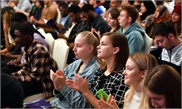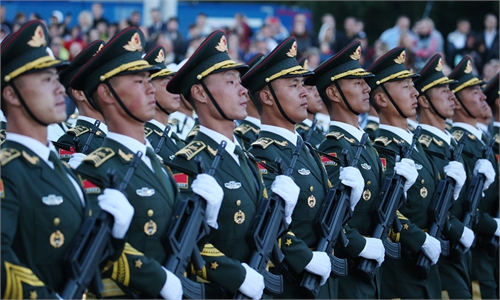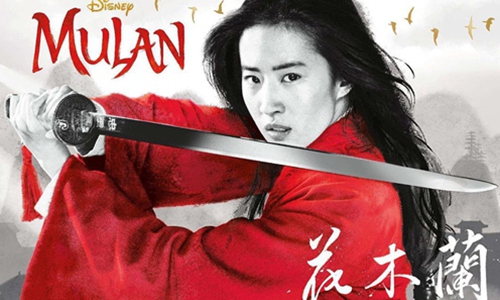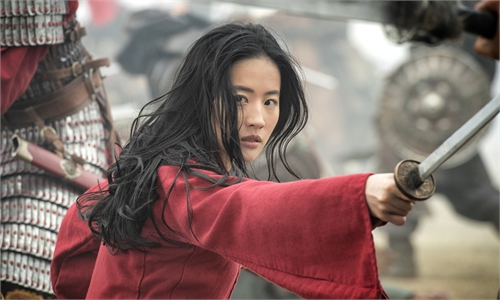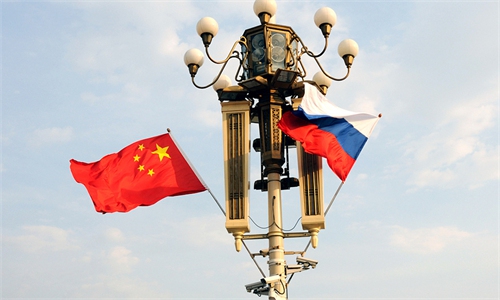To break out of its paralysis, the West needs to take a hard look and address three key challenges
The rise of the populist variant in the West and the rapid ascent of China in the East have prompted a rethinking of how democratic systems work - or don't. The creation of new classes of winners and losers as a consequence of globalisation and digital capitalism is also challenging how we think about the social contract and how wealth is shared. - Nathan Gardels and Nicolas Berggruen
http://media.asiasociety.org/video/1901010-Berggruen-Renovating-Democracy.mp4

Police officers watch as protesters take part in a rally against Covid-19 vaccine mandates, in Santa Monica, California, on Aug 29, 2021.PHOTO: AFP
Rethinking Democracy, the Social Contract, and Globalization
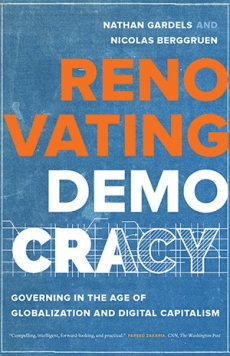
The rise of populism in the West, the rise of China in the East and the spread of peer-driven social media everywhere have stirred a rethinking of how democratic systems work—or don’t. The creation of new classes of winners and losers as a result of globalization and digital capitalism is also challenging how we think about the social contract and how wealth is shared.
The worst fear of America’s Founders—that democracy would empower demagogues—was realized in the 2016 US presidential election, when the ballot box unleashed some of the darkest forces in the body politic. Similarly, in Europe an anti-establishment political awakening of both populism and right-wing neonationalism is consigning the mainstream centrist political parties that once dominated the post–World War II political order to the margins.
Donald Trump’s election and the populist surge in Europe did not cause this crisis of governance. They are symptoms of the decay of democratic institutions across the West that, captured by the organized special interests of an insider establishment have failed to address the dislocations of globalization and the disruptions of rapid technological change. To add danger to decay, the fevered partisans of populism are throwing out the baby with the bathwater, assaulting the very integrity of institutional checks and balances that guarantee the enduring survival of republics. The revolt against a moribund political class has transmuted into a revolt against governance itself.
Because neither the stakeholders of the waning status quo nor the upstarts of populism have offered any effective, systemic solutions to what ails the West, protracted polarization and paralysis have set in.
The Paradoxes of Governance in the Digital Age
These trials of the West are bound up with, and to a significant extent driven by, two related developments: the growing fragmentation of mass society into diverse tribes fortified by the participatory power of social media, and the advent of digital capitalism, which is divorcing productivity and wealth creation from employment and income.
We argue that these shifts present twin paradoxical challenges for governance.
First, the paradox of democracy in the age of peer-driven social networks is that, because there is more participation than ever before, never has the need been greater for countervailing practices and institutions to impartially establish facts, deliberate wise choices, mediate fair trade-offs, and forge consensus that can sustain long-term implementation of policies. Despite expectations that the Internet Age would create an informed public more capable of self-government than ever before in history, fake news, hate speech, and “alternative facts” have seriously degraded the civic discourse.
Second, the paradox of the political economy in the age of digital capitalism is that the more dynamic a perpetually innovating knowledge-driven economy is, the more robust a redefined safety net and opportunity web must be to cope with the steady disruption and gaps in wealth and power that will result.
To meet these challenges, we propose a novel approach to renovating democratic institutions that integrates new forms of direct participation into present practices of representative government while restoring to popular sovereignty the kind of deliberative ballast the American Founding Fathers thought so crucial to avoiding the suicide of republics. We further propose ways to spread wealth and opportunity fairly in a future in which intelligent machines are on track to displace labor, depress wages, and transform the nature of work to an unprecedented degree.
Where China Comes In
When populists rail against globalization that has undermined their standard of living through trade agreements, they mostly have China in mind. Few reflect that China was able to take maximum advantage of the post–Cold War US-led world order that promoted open trade and free markets precisely because of its consensus-driven and long-term-oriented one-party political system. China has shown the path to prosperity is not incompatible with authoritarian rule.
In this sense, China’s tenacious rise over the past three decades holds up a harsh mirror to an increasingly dysfunctional West. The current US president, who rode an anti-globalization wave to power, relishes battling his way through every twenty-four-hour news cycle by firing off barbed tweets at sundry foes. By contrast, China’s near-dictatorial leader has used his amassed clout to lay out a roadmap for the next thirty years.
If the price of political freedom is division and polarization, it comes at a steep opportunity cost. As the West—including Europe, riven now by populist and separatist movements—stalls in internal acrimony, China is boldly striding ahead. It has proactively set its sights on conquering the latest artificial intelligence technology, reviving the ancient Silk Road as “the next phase of globalization,” taking the lead on climate change, and shaping the next world order in its image. If the West does not hear this wake-up call loud and clear, it is destined to somnambulate into second-class status on the world stage.
This is not, of course, to suggest in any way that the West turn toward autocracy and authoritarianism. Rather, it is to say that unless democracies look beyond the short-term horizon of the next election cycle and find ways to reach a governing consensus, they will be left in the dust by the oncoming future. If the discourse continues to deteriorate into a contest over who dominates the viral memes of the moment, and if democracy comes to mean sanctifying the splintering of society into a plethora of special interests, partisan tribes, and endless acronymic identities instead of seeking common ground, there is little hope of competing successfully with a unified juggernaut like China. Waiting for China to stumble is a foolish fallback.
Unlike the Soviet Union at the time of the Sputnik challenge in the late 1950s and early 1960s, China today possesses an economic and technological prowess the Soviet Union never remotely approached. Whether in conflict or cooperation, China will be a large presence in our future.
It is in that context that we examine the strengths and weakness of China’s system as a spur to thinking through our own challenges. To turn the old Chinese saying toward ourselves, “The stones from hills yonder can polish jade at home.”
Taking Back Control
To set the frame for rethinking democracy and the political economy, we argue that the anxiety behind the populist reaction is rooted in the uncertainties posed by the great transformations under way, from the intrusions of globalization on how sovereign communities govern their affairs, to such rapid advances in technology as social media and robotics, to the increasingly multicultural composition of all societies. Change is so enormous that individuals and communities alike feel they are drowning in the swell of seemingly anonymous forces and want to “take back control” of their lives at a scale and stride they can manage. They crave the dignity of living in a society in which their identity matters and that attends to their concerns. Effectively aligning political practices and institutions so as to confront these challenges head-on will make the difference between a world falling apart and a world coming together.
Critics of globalization argue that nation-states and communities must retrieve the capacity to make decisions that reflect their way of life and maintain the integrity of their norms and institutions, decisions the maligned cosmopolitan caste has handed over to distant trade tribunals or other global institutions managed by strangers. Those decisions, they rightly say, ought to be made through “democratic deliberation” by sovereign peoples. Yet that neat logic ignores the reality of decay and dysfunction we have already noted. Therefore, “taking back control” must, first and foremost, mean renovating democratic practices and institutions themselves.
The Politics of Renovation
The most responsible course of change in modern societies is renovation.
Renovation is the point of equilibrium between creation and destruction, whereby what is valuable is saved and what is outmoded or dysfunctional is discarded. It entails a long march through society’s institutions at a pace of change our incremental natures can absorb. Renovation shepherds the new into the old, buffering the damage of dislocation that at first outweighs longer-term benefits. In the new age of perpetual disruption, renovation is the constant of governance. Its aim is transition through evolutionary stability, within societies and in relations among nation-states and global networks.
In this book, we propose three ways to think about how to renovate democracy, the social contract, and global interconnectivity in order to take back control:
-
Empowering participation without populism by integrating social networks and direct democracy into the system through the establishment of new mediating institutions that complement representative government
-
Reconfiguring the social contract to protect workers instead of jobs while spreading the wealth of digital capitalism by providing all citizens not only with the skills of the future but also with an equity share in “owning the robots.” We call this universal basic capital. The aim here is to enhance the skills and asserts of the less well-off in the first place – predistribution – as a complement to redistribution of wealth for public higher education or other public goods. The best way to fight inequality in the digital age is to spread the equity around.
- Harnessing globalization through “positive nationalism,” which means an allegiance to the values of an inclusive society instead of nationalistic incantation, albeit tempered by an understanding that open societies need defined borders. It also means dialing back the hyper-globalization of “one size fits all” global trade agreements to leave room for industrial policies that compensate for the dislocations of integrated global markets. To temper the deepening rivalry, even economic decoupling underway between the US and China, we call for a “partnership of rivals” on climate action. If there is not some area of common intents, all else will dwell in the shadow of distrust and lead to a new Cold War, the breakup of the world into geopolitical blocs and worse.
These proposals, of course, do not exhaust the answers to the panoply of daunting challenges we have raised. But they do suggest ways we might think about how to change present social and political arrangements for addressing those challenges. We do not insist that we are somehow the font of all wisdom but regard our endeavor as a point of departure that deepens and expands the debate. Without concrete propositions to criticize and amend, the discourse about change is only an airy exchange that fails to move the needle.
 Nicolas Berggruen and Nathan Gardels are the founders of the Berggruen Institute and the authors of Intelligent Governance for the 21st Century: A Middle Way between West and East (2012). Their latest work, Renovating Democracy: Governing in the Age of Globalization and Digital Capitalism (2019), is the first in a Berggruen Institute series on the “Great Transformations” published by the University of California Press (UC
Nicolas Berggruen and Nathan Gardels are the founders of the Berggruen Institute and the authors of Intelligent Governance for the 21st Century: A Middle Way between West and East (2012). Their latest work, Renovating Democracy: Governing in the Age of Globalization and Digital Capitalism (2019), is the first in a Berggruen Institute series on the “Great Transformations” published by the University of California Press (UC
Related posts:
Moral vacuum at the heart of modernity, now embodied in US laws!
` ` MAN and nature are running out of time. That’s the core message of the UN Inter-governmental Panel on Climate Change ...








